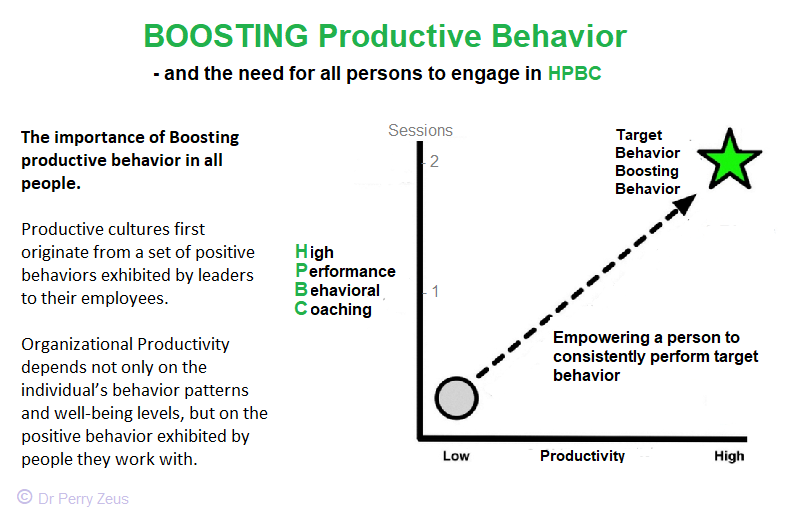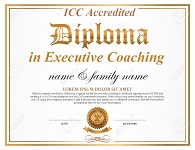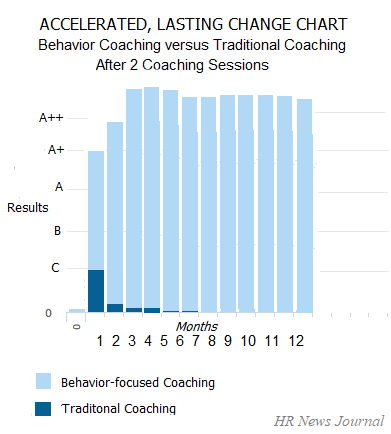-and the need for
Behavioral Flexibility to achieve our goals..
-
Achieving
Behavioral Change with validated Neuro-Behavioral Coaching Techniques
(includes extracts from text book 'Behavioral
Coaching' by Zeus and Skiffington - McGraw-Hill Professional
Publishing)
Behavioral
flexibility and Performance.
If you want the same results, then keep doing what you are doing. A
major barrier to improving performance is rigid thinking or habitual
responses formed from previous experience. We all need to recognize
when to persist and when to adopt a different approach.
Each of us has a set of behaviors which defines us. Too often, we
become comfortable acting a certain way and struggle with behaving
in a different fashion. How we act is a reflection of where we
stand. Think of it like this, what makes a person more effective at
what they do?
The Science
Cognitive and behavioral flexibility is a core adaptive function of
the executive control system in the human brain. Executive functions
include a set of processes that allow for control in “nonroutine
situations.” Goal-directed behavior requires a plausible sequence of
actions that must be accomplished to achieve it but also an ability
to prioritize goals (represent the relative value of various goals
at a given time), initiate a goal-directed process, and maintain
goal pursuit in the face of unexpected environmental factors. Too
much environmental dependency will result in distractibility, a
tendency for tasks to be interrupted, and, ultimately, an inability
to complete a complex task sequence aimed toward a particular goal.
However, one must also be able to discontinue an activity, switching
to a different task when appropriate. An excessively rigid adherence
to a predetermined behavioral pattern prevents an individual from
appropriately responding to changing environmental contingencies.
In most performance tasks impairments of behavioral flexibility
account for a significant restriction in the range of self-generated
behaviors (reactions, feelings and actions) an individual exhibits
leading to a breakdown in task functioning, and in many cases
-stress and acceptance of lower levels of accomplishment or failure.
Mental Strength
Perseveration (repeated behavior), in its broadest
conceptualization, can occur at a variety of levels of organization
from simple motor behaviors -verbal utterances, and perseveration of
affect in mood and anxiety disorders. Hence, the need for leaders to
be able to flex their style, dependent on the situation. For
example; A business faced with new, adverse market conditions,
requires a different style to one which was enjoying a profitable,
steady state.
The ability to use different thinking strategies and mental
frameworks.
Leaders who have behavioral flexibility are more able to incorporate
different mental frameworks and thinking strategies into their
people management, project planning, decision-making, and the
general management of day-to-day work. They can simultaneously hold
multiple scenarios in mind and can see when to shift and inject a
change in themselves. Behavioral flexibility in a leader indicates
nimble, divergent thinking, an interest in developing new
approaches, the ability to see and leverage new connections, and the
propensity to work well across the organization. These leaders
readily learn from experience and recognize when habitual approaches
don’t work.
Maintaining behavioral flexibility, i.e., the capacity to
shift behavioral strategies in a changing environment, is critical
to an individual’s ability to update environmental representations.
Individuals with low behavioral flexibility can suffer higher levels
of stress, less growth and optimism. Conversely, individuals with
heightened behavioral flexibility exhibit enhanced resilience to
change and self-efficacy. Clinical studies have shown that
individuals with very low levels of flexibility exhibit increased
psychopathology characterized in affective, anxiety, and mental
disorders.
The good news is that behavioral flexibility can be heightened in
most people to help them progress to their next level of success and
beyond.
John, a senior manager in an IT business, described a situation
where his boss failed to adapt her leadership style. They had to
deliver on a 14-week contract and were 3 weeks behind schedule. John
said: “She’s great at recognizing where the problems exist, but
she’s not driving the accountability for getting them fixed.” His
boss’s high-level view wasn’t enough. At this project-critical
stage, she needed to grasp more of the detail – both of the project
and of the dynamics occurring within her senior team. She wasn’t
adapting her style to the changing circumstances.
As people move into leadership positions and up into senior
management, they need to develop a wider set of skills. Each
leadership transition needs to come with a parallel shift in
self-concept, for example, from an individual contributor to a team
leader, or from a functional manager to an enterprise-wide leader.
Behavioral flexibility is ultimately the ability to adjust our
behaviors, so that we can deal with different scenarios in the most
effective manner possible. To create a safe space that allows all
people to shine and be successful requires leaders to develop a flexible behavioral
repertoire.
Today's distinctive leaders set themselves apart, not by adherence to a
particular leadership creed, but by the way they behave in a range
of challenges. The wider their behavioral repertoire, the more
effective their leadership.
Developing behavioral flexibility is not just about knowing what to
do and exercising those behaviors skilfully. It’s also about knowing
what not to do and avoiding potentially costly mistakes. The
humility required to reflect on your own and others’ behavior as a
leader and to then change and flex as required is the one element
that a leader should never be without.
Behavioral flexibility is about:
- Having the ability to change the actions you have, when they don’t
deliver the outcome you are looking for.
- Trying to do things differently when you discover they don’t work,
or because you are not getting the results you are looking for.
- Taking the time to step beyond your comfort zone.
- Ultimately, behavioral flexibility is about saying “how can I
change my behavioral drivers that will result in a different and
improved outcome?”
When you have behavioral flexibility you can change and adapt to
different situations; you can expand your mind, improve your
decision-making, your tactical thinking, your performance and be
flexible in your communication with others but importantly you get
better results!

The BOTTOM LINE
It is essential to devote energy and time to be: creative, embark
upon challenging tasks, new projects, adventures. It is precisely
our ability to flexibly undertake new challenges that is the
greatest source of sustainability. Like learning to walk, forcing
ourselves out of balance as we step is the only way in which we can
move forward. And it is the only way that human flourishing can be
enhanced.
It’s simple really. If you are getting the best results you want, then
continue to do what you’re doing. If not, it’s time to explore
variations on things and reach new levels of success by adapting and
adjusting.
Ultimately, it’s about learning who you really are. Developing
behavioral flexibility provides a journey of self-discovery for
exploring our personalities, our potential, our lives, and the human
condition.
HOW TO INCREASE
BEHAVIORAL FLEXIBILITY
Flexible / Modifiable Behavior versus Fixed Behavior
Today’s behavioral science has confirmed that Emotion feelings
constitute the primary motivational component of mental operations
and behavior. One of the major qualities of emotional drivers of
behavior is its flexibility, which contrasts with the rigidity of
the small number of stereotyped, fixed behaviors formed by reflexes.
Emotion-driven behavior has the ability to respond to the ongoing
demands of experience with a range of interchangeable, adaptive,
emotions in a manner that is more preferable.
By monitoring, evaluating, and modifying emotional reactions we can
generate a whole range of results depending upon which emotion
driver we select to use. This includes the regulation of one's own
feelings (the expression of our emotions).
Behavioral flexibility is all about modulating one's state or
behavior in a given situation – for example the subjective
experience (feelings), cognitive responses (thoughts),
emotion-related physiological responses (for example heart rate or
hormonal activity), and emotion-related behavior (bodily actions or
expressions).
Today, there is a “new alliance” between the behavioral sciences,
neuroscience and psychotherapy. The result is Next Gen Coaching sweeping across the global
organizational / business landscape.
Be part of the future
Today’s next generation coaches surpass yesterday’s first-generation
coaches knowledge, skills and practice standards.
The Behavioral Coaching Institute’s
courses are acknowledged as the
global leaders in Next Generation Coaching.
Behavioral focused coaching Change Models and Tools
By using the latest human performance psychology from the fields of
neuroscience and neuropsychology the Institute’s students
learn how
to assist all people, in all positions to refine their mindset,
emotional control, neuro-behavioral patterns and way of thinking.
The Behavioral Coaching Institute
(established 1994 -world's first professional coach training School)
The
Behavioral Coaching Institute’s
(BCI's) internationally, recognized Coach training courses meets the
critical needs for people development practitioners to be trained
(via fast-tracked, Self-Study/E-Learning course format) in the use
of a range of validated, reliable, neuro-behavioral change models,
tools and techniques with a user-friendly, coaching delivery model.
The
Behavioral Coaching Institute’s range of specialist
courses include; easy-to-follow, accelerated, step-by-step,
intervention protocols and an extensive, proprietary Behavioral
Development ToolKit. Measured, sustainable positive results are
generated by clients of our graduates typically within just two to three,
short coaching sessions.




